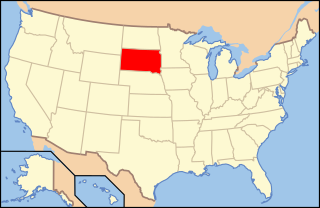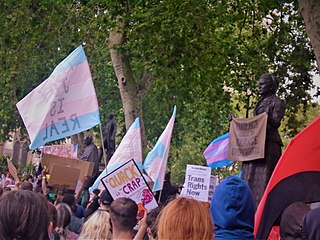The legal status of transgender people varies greatly around the world. Some countries have enacted laws protecting the rights of transgender individuals, but others have criminalized their gender identity or expression. In many cases, transgender individuals face discrimination in employment, housing, healthcare, and other areas of life.

Non-binary and genderqueer are umbrella terms for gender identities that are outside the male/female gender binary. Non-binary identities often fall under the transgender umbrella since non-binary people typically identify with a gender that is different from the sex assigned to them at birth, although some non-binary people do not consider themselves transgender.
Gender neutrality, also known as gender-neutralism or the gender neutrality movement, is the idea that policies, language, and other social institutions should avoid distinguishing roles according to people's sex or gender. This is in order to avoid discrimination arising from the impression that there are social roles for which one gender is more suited than another. The disparity in gender equality throughout history has had a significant impact on many aspects of society, including marketing, toys, education and parenting techniques. In order to increase gender neutrality in recent years, there has been a societal emphasis on utilizing inclusive language and advocating for equality.
The following outline is provided as an overview of and topical guide to transgender topics.

Transgender rights in Iran are limited, with a narrow degree of official recognition of transgender identities by the government, but with trans individuals facing very high levels of discrimination, from the law, the state, and from the wider society.
The gender binary is the classification of gender into two distinct forms of masculine and feminine, whether by social system, cultural belief, or both simultaneously. Most cultures use a gender binary, having two genders.

A transgender person is someone whose gender identity differs from that typically associated with the sex they were assigned at birth. Some transgender people who desire medical assistance to transition from one sex to another identify as transsexual. Transgender can function as an umbrella term; in addition to including binary trans men and trans women, it may also include people who are non-binary or genderqueer. Other definitions of transgender also include people who belong to a third gender, conceptualize transgender people as a third gender, or conflate the two concepts. The term may also include cross-dressers or drag kings and drag queens in some contexts. The term transgender does not have a universally accepted definition, including among researchers.
In the United States, the rights of transgender people vary considerably by jurisdiction. In recent decades, there has been an expansion of federal, state, and local laws and rulings to protect transgender Americans; however, many rights remain unprotected, and some rights are being eroded. Since 2020, there has been a national movement by conservative/right-wing politicians and organizations to target transgender rights. There has been a steady increase in the number of anti-transgender bills introduced each year, especially in Republican-led states.

Lesbian, gay, bisexual, transgender, and queer (LGBTQ) people in the U.S. state of South Dakota may face some legal challenges not experienced by non-LGBTQ residents. Same-sex sexual activity is legal in South Dakota, and same-sex marriages have been recognized since June 2015 as a result of Obergefell v. Hodges. State statutes do not address discrimination on account of sexual orientation or gender identity; however, the U.S. Supreme Court's ruling in Bostock v. Clayton County established that employment discrimination against LGBTQ people is illegal under federal law.
Discrimination against non-binary people, people who do not identify exclusively as male or female, may occur in social, legal, or medical contexts.
Feminist views on transgender topics vary widely.
The participation of transgender people in competitive sports, a traditionally sex-segregated institution, is a controversial issue, particularly the inclusion of transgender women and girls in women's sports.

Intersex people are born with sex characteristics, such as chromosomes, gonads, or genitals that, according to the United Nations Office of the High Commissioner for Human Rights, "do not fit typical binary notions of male or female bodies".

Multiple countries legally recognize non-binary or third gender classifications. These classifications are typically based on a person's gender identity. In some countries, such classifications may only be available to intersex people, born with sex characteristics that "do not fit the typical definitions for male or female bodies."

Transgender rights in the United Kingdom have varied significantly over time.

Transgender and travesti rights in Argentina have been lauded by many as some of the world's most progressive. The country "has one of the world's most comprehensive transgender rights laws": its Gender Identity Law, passed in 2012, made Argentina the "only country that allows people to change their gender identities without facing barriers such as hormone therapy, surgery or psychiatric diagnosis that labels them as having an abnormality". In 2015, the World Health Organization cited Argentina as an exemplary country for providing transgender rights. Leading transgender activists include Lohana Berkins, Diana Sacayán, Mariela Muñoz, María Belén Correa, Marlene Wayar, Claudia Pía Baudracco, Susy Shock and Lara Bertolini.
The legal and regulatory history of transgender and transsexual people in the United States begins in the 1960s. Such legislation covers federal, state, municipal, and local levels, as well as military justice. It reflects broader societal attitudes which have shifted significantly over time and have impacted legislative and judicial outcomes.

The regulations regarding the service of intersex people in the United States Armed Forces are vague and inconsistent due to the wide range of human intersex conditions. The United States Armed Forces as a whole does not officially ban intersex people from service but does exclude many based on the form of their status. Policies regarding all intersex people are not addressed formally although depending on the type of sex variation some intersex people are allowed to serve. The United States military and their requirements for service makes it so they are frequently in a unique predicament when it comes to intersex bodies. With their position of needing to discern between male and female bodies, they are exposed to a broad variety of people, such as those who are intersex whose bodies may not match either classification and are more difficult to make decisions on. This ambiguity leads to confusion regarding military medical, behavioral, and legal laws.

Dana Alix Zzyym is an intersex activist and veteran of the U.S. Navy. After the culmination of a six-year legal battle, they became the first U.S. citizen to receive an official U.S. passport with an "X" sex/gender marker.
The following is a timeline of transgender history. Transgender history dates back to the first recorded instances of transgender individuals in ancient civilizations. However, the word transgenderism did not exist until 1965 when coined by psychiatrist John F. Oliven of Columbia University in his 1965 reference work Sexual Hygiene and Pathology; the timeline includes events and personalities that may be viewed as transgender in the broadest sense, including third gender and other gender-variant behavior, including ancient or modern precursors from the historical record.









